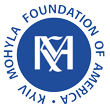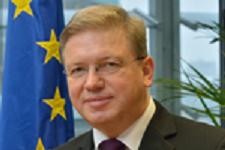Featured Galleries USUBC COLLECTION OF OVER 160 UKRAINE HISTORIC NEWS PHOTOGRAPHS 1918-1997
 Holodomor Posters
Holodomor Posters

Kyiv Mohyla Academy Hosts EU Commissioner Štefan Füle
 Kyiv Mohyla Foundation of America,
Kyiv Mohyla Foundation of America,
Kyiv, Ukraine, Thursday, February 14, 2013
I enjoy being in Ukraine, here at Mohyla Academy and I enjoy being proud to call myself a friend of Ukraine. It is a privilege for me to address this audience of students, professors and representatives of civil society. I am very pleased to have the opportunity to share with you some important messages that I brought with me from Brussels to Kyiv. Earlier today I addressed the Cabinet of Ministers and also the Verkhovna Rada, which was itself a unique opportunity. I take it as a tribute to the special relationship between the EU and Ukraine.
Speech for the conference with Civil Society (EaP National Platform) and professors/students of Mohyla Academy (08/02/2013)
Ladies and Gentlemen,
Dear friends,
I enjoy being in Ukraine, here at Mohyla Academy and I enjoy being proud to call myself a friend of Ukraine.
 It is a privilege for me to address this audience of students, professors and representatives of civil society. I am very pleased to have the opportunity to share with you some important messages that I brought with me from Brussels to Kyiv. Earlier today I addressed the Cabinet of Ministers and also the Verkhovna Rada, which was itself a unique opportunity. I take it as a tribute to the special relationship between the EU and Ukraine.
It is a privilege for me to address this audience of students, professors and representatives of civil society. I am very pleased to have the opportunity to share with you some important messages that I brought with me from Brussels to Kyiv. Earlier today I addressed the Cabinet of Ministers and also the Verkhovna Rada, which was itself a unique opportunity. I take it as a tribute to the special relationship between the EU and Ukraine.
Now, I am particularly keen to reach out to you because I think it is essential that as many people as possible in the Government, the Parliament and Ukrainian society at large feel part of the European integration project. Building European Union in Ukraine should be a shared endeavour in which all parts have a distinct but equally important role to play.
The young generation – Ukraine's future
It is a real pleasure for me to have the opportunity today to interact with Ukraine’s young generation– the future of Ukraine. But when we look ahead, we should not forget our heritage. What Ukrainian institution represents these two aspects – youth and heritage – better than the Kyiv Mohyla Academy, one of the oldest Ukrainian universities, founded in 1615.
The Academy is also the only university in Ukraine which has a fully-fledged European studies program and the academic institution which granted the first ever European-style PhD diploma in Ukraine. I hope that my messages will strike a chord in this illustrious venue and with this audience.
Before moving on to the issue of European Union-Ukraine relations and their prospects, please let me congratulate the professors as well as the students of this Academy for their achievements. I know that this university actively participates in European Union-funded programs like Tempus, Jean Monnet and Erasmus Mundus. It is our wish to increase such opportunities in future. I know the graduates of this Academy reach top positions both in the government and in business. I hope that more of you will bring a personal contribution to building European Union in Ukraine, either as civil servants able to think out of the box or as the leaders of competitive and innovative businesses.
Hearing the voice of civil society
Allow me to tell you how satisfied I feel to seethe steady development of the National Platform of Eastern Partnership Civil Society Forum which is present here today. It encompasses many different groups with differing backgrounds, from advocacy groups to businesses, and from charities to academic and religious organisations. The voice of the National Platform resonates more and more clearly in Brussels and among the European representatives of civil society. I have seen first-hand the great contribution that it is making to our new neighbourhood policy and I would like to express my appreciation for this.
I hope the National Platform will continue to grow and become an even stronger voice with real influence on the policies of Ukraine. The diversity of a rich civil society is good for democracy and good for creativity. You know the realities of living in Ukraine and the many challenges of its modernisation. Ukraine’s European course of modernisation needs to reflect its own realities but without taking this as an excuse for lagging behind in reforms, or for holding back from embedding the common values which are at the core of the European construction.
A defining moment in our relations
My visit to Kyiv takes place at a key moment in relations between the European Union and Ukraine. You may have heard about “defining moments” many times, but this time it is for real.
After more than five years of bilateral negotiations the European Union and Ukraine have the possibility to lay the foundations of an enhanced relationship based on the most advanced Association Agreement and Deep and Comprehensive Free Trade Area the European Union has negotiated with any third partner, a truly historic opportunity.
It provides for significant new openings for Ukrainian products and services to the biggest internal market in the world – the European Union. This will make a real difference to the lives of Ukrainian people. Economic integration will mean even higher standards, competitiveness and a legacy of economic growth and jobs in Ukraine.
And above all, the Agreement is about sharing our values. It is about freedom: the freedom to focus on developing your ideas without worrying about how to protect them or hide them, the freedom to unleash your full potential. It is you, the Ukrainian citizens who will be at the centre of this project, building democracy, unity and prosperity in your country and benefiting from the high democratic standards and real guarantees for rights and opportunities that the Agreement offers.
But the European Union can only extend its offer to a partner that believes in our common values and shares the spirit of political association and economic integration. After several recent setbacks in Ukraine, there is a need to re-gain confidence that Ukraine could emerge as a modern European country.
European perspective
I have a VISION of a prosperous Ukraine, loyal to our common values, consolidated, modernised, and integrated into the European family. But it is more than a VISION. The prospects for moving forward are real, solidly grounded in hard work and in pro-active diplomacy. Let me give you three reasons to support this viewpoint:
First, in December the 27 foreign ministers of the European Union put the wheels in motion for the signature of the Association Agreement and Deep and Comprehensive Free Trade Area, maybe even by the time of the Eastern Partnership Summit in Vilnius in November, once there is determined action and tangible progress on a number of benchmarks in three key areas.
These are:
• the follow-up work to address the shortcomings in the October Parliamentary elections;
• addressing the issue of selective justice and preventing its recurrence; and
• progressing on reforms as set out in the jointly agreed Association Agenda, for example in areas such as the reform of the judiciary, respect for the rule of law and human rights, the fight against corruption as well as increasing citizens’ participation in public decision-making in Ukraine
Second, at the meeting I attended today with the Cabinet of Ministers of Ukraine I sensed a willingness to create the right circumstances to advance in the implementation of these benchmarks.
Third, at my meeting at the Verkhovna Rada, I felt a cross party commitment to advance on the path of Ukraine’s political association and economic integration with the European Union, a process that will benefit from close scrutiny and also support from Ukrainian people and civil society.
Time to act
Now, a message of urgency. We have an unprecedented opportunity to make an important leap in relations between the European Union and Ukraine, but time is short. We need to see some tangible signs of progress over the coming months as we prepare for the key milestone of the Eastern Partnership Summit in Vilnius this November.
Compared to my last visit to Ukraine five months ago, there has been some – but altogether rather limited – progress on the key areas. I hope that five months from now, I will be able to say that there has indeed been determined action and substantial, tangible progress by Ukraine on the benchmarks.
Don’t underestimate the importance the Governments, Parliaments and public opinion of the Member States are attaching to the situation in Ukraine and to the need of addressing the issue of selective justice and preventing its recurrence. Let us not make a mistake: it is a huge political distraction from the main objective.
In this context, the European Union is concerned about recent developments related to Yuri Lutsenko and Yulia Tymoshenko, as well as investigations involving Ms Tymoshenko's close collaborators, and about the overall political context. And my yesterday´s discussion with Presidents Cox and Kwasniewski about their recent mission has reminded me one more time about the urgency of this issue.
Cooperation in many areas
Let me mention our on-going cooperation, starting with visas. I know that this is one of the areas of cooperation that makes the most visible difference to citizens on the ground.
As regards the implementation of the Action Plan on Visa Liberalisation, it is almost one year since our Second Report on the implementation of the Visa Liberalisation Action Plan was issued. Additional progress has been made but still not enough to fulfil all the benchmarks of the first phase of visa liberalisation. The most sensitive ones: anti-corruption, anti-discrimination, minorities and data protection still need to be adopted or rather re-adopted. Why re-adopted? Because they only pretend but in reality do not reflect the requirements put forward by the European Union
Meanwhile, I am looking forward to the swift ratification of the European and Ukrainian parliaments of the amendments to the existing European Union-Ukraine Visa Facilitation Agreement signed in July 2012.
I have so far spoken of the opportunities and challenges offered by the possible signing of the Association Agreement. Before concluding I would also like to say a few words about some other main areas of cooperation in support of Ukraine’s modernisation. Work is on-going in many areas: for example, the European Union remains committed to the delivery of European Union Macro-Financial Assistance, and we continue to work closely with Ukraine's Ministry of Energy to facilitate support from International Financial Institutions for the modernisation of the Ukrainian Gas Transmission System in line with Ukraine's Energy Community commitments. By the way what Ukraine has done in the energy field is impressive – to make arrangements for the first time to receive gas not from the east but from the west and even cheaper. Herewith you have built a new confidence.
Conclusion
Now I would like to open the debate to your questions and views which I will take back with me to Brussels and our Member States as we prepare for the upcoming European Union-Ukraine Summit later this month European Union-Ukraine relations have gone through difficult times and there is a lot of homework to do. But the opportunities ahead are important. We have the historic opportunity now of reshaping the post-Soviet region in Eastern Europe to meet the needs and aspirations of citizens, who have the right to hold their politicians accountable for delivering on the promise of change. The year2013 should be an interesting, challenging and, hopefully, a very rewarding year.
Thank you for your attention.











